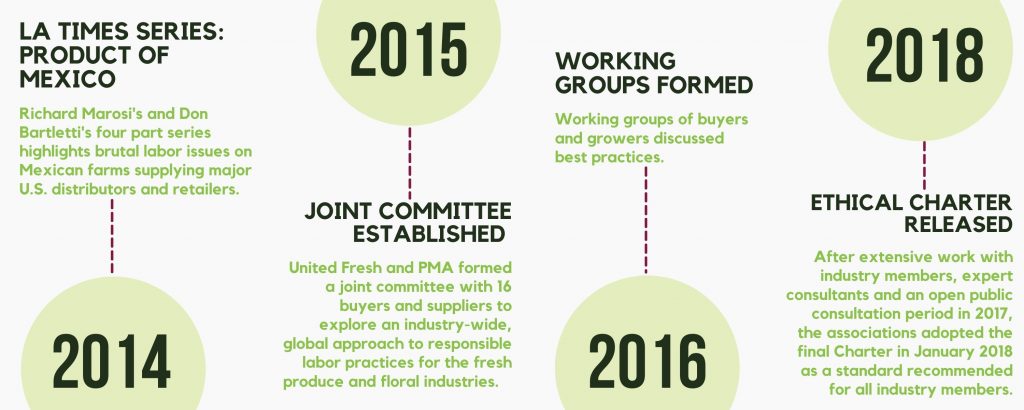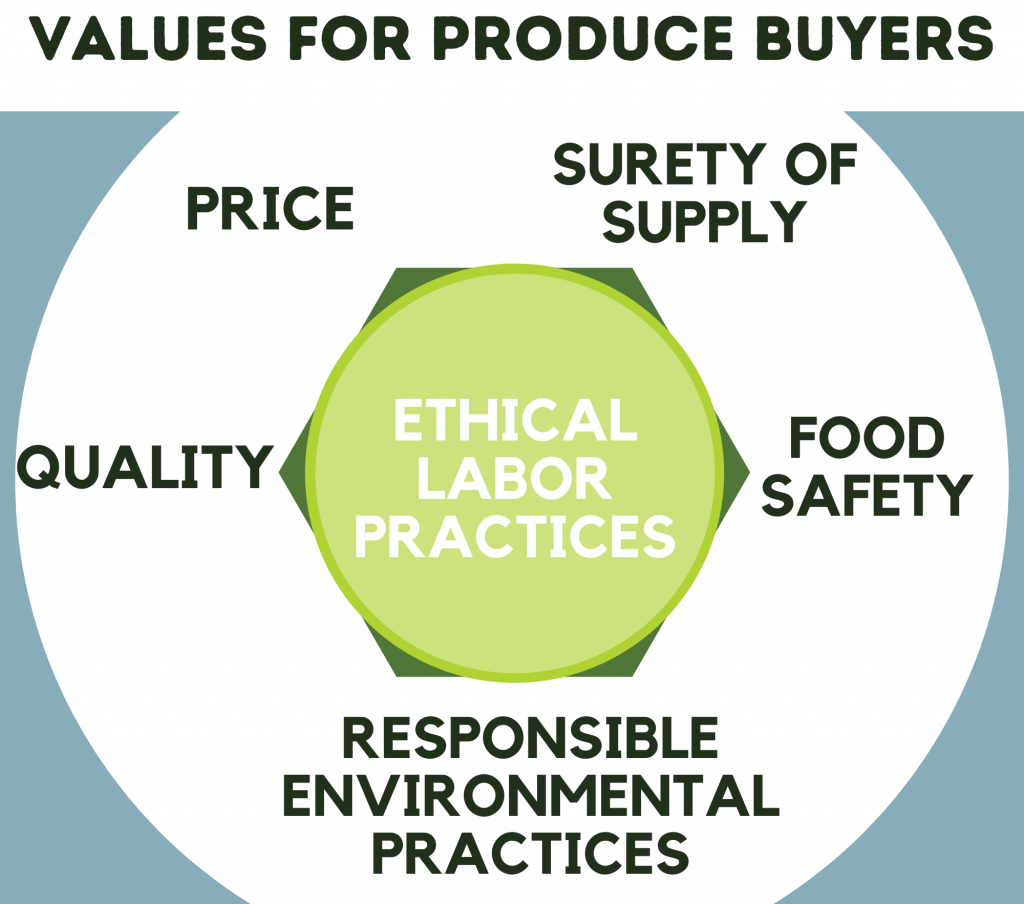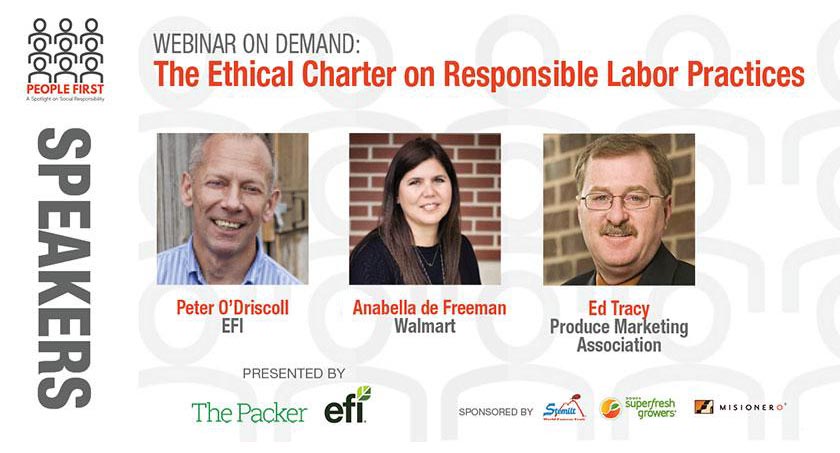How the Ethical Charter Contributes to Business Success in Labor Practices and Revenue
Watch the webinar presented by The Packer and EFI.
The Fresh Produce Industry is Moving Toward the Principles Set in the Ethical Charter
The issue of ethical labor practices is on the rise for the fresh produce industry, on a journey much like that of food safety. Industry professionals agree that the principles outlined in the Ethical Charter will become a minimum standard required for doing business.
“Sustainability requirements, planet & people, are becoming the norm, not the exception—and not just for the big chains, but across food service, including small and medium chains. We’re seeing consumers forcing retailers that didn’t take a position on sustainability to engage because they want to ensure that the products they’re buying from all retailers align with their personal values.”
– Ed Tracy, Vice President, Supply Chain Efficiencies, PMA
Origins of the Ethical Charter
Based on a foundation of employment law, good management systems and sound occupational safety and health practices, the Ethical Charter on Responsible Labor Practices is the culmination of an industry-wide initiative to set the standard for responsible labor practices in the fresh produce and floral industries.

What’s in the Ethical Charter?
The Ethical Charter includes 13 standards in three sections:
- Respect for Laws at Work: Legal Compliance; Occupational Safety & Health; Wages & Benefits; and Working Hours
- Respect for Human Rights: Employment is Freely Chosen; Freedom of Association; Humane Treatment and Non-Harassment; Non-Discrimination; and Protection of Children and Young Workers
- Respect for Professional Conduct: Communication and Worker Protections; Ethical Recruitment; Responsible Purchasing Practices; Management Systems and Continuous Improvement
“The Ethical Charter is very aligned with Walmart’s standards for suppliers. We believe that responsible labor practices is the way of doing business. As the Ethical Charter is going to be endorsed by the vast majority of the industry, later on, if you are not endorsing it—the question would be why not? Why wouldn’t you align with these principles that the rest of the industry is accepting, endorsing and adopting?”
– Anabella de Freeman, Sr. Manager, Sustainability Strategic Initiatives Produce, Walmart
Breaking New Ground in the Industry
The third section of the charter breaks new ground in the fresh produce industry by speaking to some of the components of a healthy, productive, efficient workplace culture. The standards in this section address communication between workers and managers, how recruitment happens and violations in recruitment whether foreign or domestic.
By addressing management systems and continuous improvement, this section of the Ethical Charter looks beyond the need for right behavior from industry players and puts a focus on making sure there are actual systems, controls and measures in place for a farming operation to ensure worker voice and agency.
As an industry-wide initiative, the principles in the Respect for Professional Conduct section are not just about supplier behavior, but also about the buying community recognizing the support that it can provide suppliers in upholding the principles of the Charter.
“A healthy, proactive, motivated workforce is going to be more productive and efficient, and is going to help you meet the quality, price and continuity requirements of your buyers. It’s also going to give you the basis for implementing sustainability initiatives and the opportunity to have a workforce that cares about food safety measures and actually takes care of the product at the point of production.”
– Peter ‘Driscoll, Executive Director, EFI
How Does the Ethical Charter Fit With Buyer Priorities?
There is a connection between the Ethical Charter and all of the other requirements that the buying community is looking for. Responsible labor practices are the key for implementing any of these other initiatives that are important to buyers, including quality, price, surety of supply, food safety and sustainability practices.

“Food safety has become a minimum standard that everybody has to comply with. I think responsible labor practices will be also a minimum standard that is required for the produce that we sell.”
– Anabella de Freeman, Sr. Manager, Sustainability Strategic Initiatives Produce, Walmart
How to Adopt and Endorse the Ethical Charter
The process of adopting and endorsing the Ethical Charter is open to all fresh produce and floral companies.
At EthicalCharter.com you can find an FAQ about the charter, review charter principles and instructions for becoming an endorser. Download and complete the Employer Self-Assessment Tool to evaluate your company’s performance against the Ethical Charter. Once complete, send a letter to the board of directors on company letterhead and join the list of endorsers of the Ethical Charter.
“Most companies that have endorsed the Charter didn’t have to change the way they run their business, because they’re ethical. Endorsing the charter does require documentation and paperwork, but the working group has made it very easy for companies to self-evaluate, adopt and endorse the charter.”
– Ed Tracy, Vice President, Supply Chain Efficiencies, PMA
Option of Third-Party Verification
Certification by a third party is not required to endorse the Ethical Charter, however, there are third party certifiers that have benchmarked their standards to it. By obtaining one of these certifications an operation can publicly display that they are in compliance with the Ethical Charter in their marketing to consumers and in conversations with buyers. Suppliers can talk to their customers about which certifications are currently accepted regarding the Ethical Charter.
Related Articles:
The Ethical Charter and EFI Help Growers Compete in Today’s Marketplace
Equitable Food Initiative Updates Labor Standards to Include Ethical Charter Addendum
Putting the Ethical Charter Into Action
Other Posts in the People First Series:
Webinar Recap: Myths and Realities of Social Compliance
Webinar Recap: Integrating Worker Voice
Webinar Recap: Responsible Recruitment


